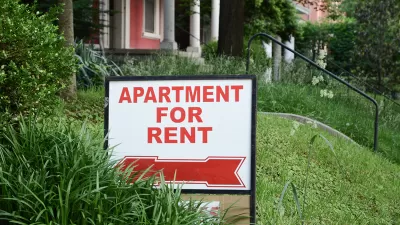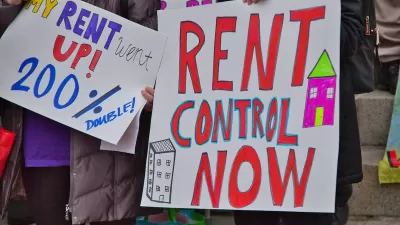With rental vacancy rates declining across America, the expansion of rent control policies may seem like a logical solution for protecting vulnerable renters from fast rising prices. But Peter Tatian argues there's little evidence that it works.
As cities across the U.S. search for solutions for the growing crisis in affordable housing, Tatian samples the research literature on the application of rent control and finds "very little evidence that rent control is a good policy."
"Arguments against rent control go back as far as the 1970s and the RAND housing allowance experiments in New York City. More recently, a MIT study of the 1995 repeal of rent control in Cambridge, Massachusetts, found that investment in housing increased after rent control ended, leading to “major gains in housing quality.” A National Bureau of Economic Research paper also examined the Cambridge experience and concluded that 'elimination of rent control added about $1.8 billion to the value of Cambridge’s housing stock between 1994 and 2004, equal to nearly a quarter of total Cambridge residential price appreciation in this period.'”
But what about more nuanced "rent stabilization" policies? In a comprehensive overview of the research literature, Blair Jenkins found that "rent stabilization doesn’t do a good job of protecting its intended beneficiaries—poor or vulnerable renters—because the targeting of the benefits is very haphazard," notes Tatian.
"Given the current research, there seems to be little one can say in favor of rent control," concludes Tatian. "What, then, should be done to help renters obtain affordable, decent housing? A better approach may be adopting policies that encourage the production of more diverse types of housing (different densities, tenure types, unit sizes, etc.), implementing strong regulations and practices to ensure housing quality and to protect tenants from abuses; and providing targeted, direct subsidies to people who need help paying their rents."
FULL STORY: Is Rent Control Good Policy?

Alabama: Trump Terminates Settlements for Black Communities Harmed By Raw Sewage
Trump deemed the landmark civil rights agreement “illegal DEI and environmental justice policy.”

Planetizen Federal Action Tracker
A weekly monitor of how Trump’s orders and actions are impacting planners and planning in America.

The 120 Year Old Tiny Home Villages That Sheltered San Francisco’s Earthquake Refugees
More than a century ago, San Francisco mobilized to house thousands of residents displaced by the 1906 earthquake. Could their strategy offer a model for the present?

Opinion: California’s SB 79 Would Improve Housing Affordability and Transit Access
A proposed bill would legalize transit-oriented development statewide.

Record Temperatures Prompt Push for Environmental Justice Bills
Nevada legislators are proposing laws that would mandate heat mitigation measures to protect residents from the impacts of extreme heat.

Downtown Pittsburgh Set to Gain 1,300 New Housing Units
Pittsburgh’s office buildings, many of which date back to the early 20th century, are prime candidates for conversion to housing.
Urban Design for Planners 1: Software Tools
This six-course series explores essential urban design concepts using open source software and equips planners with the tools they need to participate fully in the urban design process.
Planning for Universal Design
Learn the tools for implementing Universal Design in planning regulations.
Clanton & Associates, Inc.
Jessamine County Fiscal Court
Institute for Housing and Urban Development Studies (IHS)
City of Grandview
Harvard GSD Executive Education
Toledo-Lucas County Plan Commissions
Salt Lake City
NYU Wagner Graduate School of Public Service





























